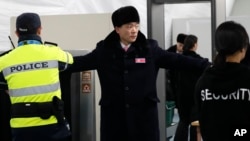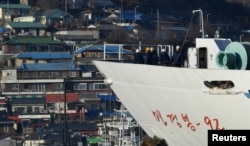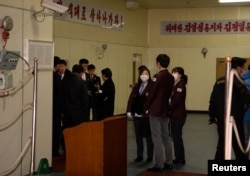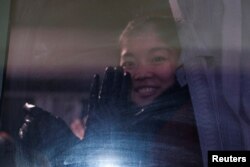A minor controversy in South Korea over permitting a North Korean ferry to transport an art troupe to the Olympics, illustrates the complexity involved in facilitating the North's Olympic participation without violating both international and bilateral sanctions.
North Korea on Tuesday sent its 140-member Samjiyon Band orchestra, including musicians, dancers and singers, to South Korea aboard its Mangyongbong-92 ferry to perform during the 2018 PyeongChang Winter Olympics.
The ship docked at the eastern coastal city of Gangneung, where Olympic ice skating venues are located.
Sanctions exemption
The Mangyongbong-92 is not among the list of North Korean ships blacklisted by United Nations sanctions for aiding the country's nuclear development program.
But Seoul's bilateral "May 24 measures" imposed in 2010, after Pyongyang was accused of torpedoing the South's Cheonan naval vessel and killing 46 sailors, ban all North Korean vessels from entry into its territory .
The South Korean Unification Ministry on Monday announced it would waive the sanctions in this case because ofthe North's Olympics participation.
"We are considering it as an exception to the May 24 measures to support the successful hosting of the PyeongChang Olympic Games," said Unification Ministry spokesman Baik Tae-hyun on Monday.
The sanctions exception has sparked criticism of South Korean President Moon Jae-in for offering what opponents say are unilateral concessions to facilitate the North's participation, despite concerns that the repressive Kim Jong Un led government is using the Olympics to rehabilitate it's threatening image, and weakening support for sanctions imposed for its ongoing development of nuclear weapons including long-range ballistic missiles that can reach the U.S. mainland.
The South Korean JoonAng Daily newspaper published an editorial Tuesday saying, "North Korea has succeeded in making a hole in the sanctions."
Ulterior motives
North Korea used the Mangyongbong-92 to transport a past delegation to the 2002 Asian Games in the South Korean port city of Busan. The ship will serve as lodging for the participants, and it will give the North Korean government greater control over the movements of its visiting delegation.
However Pyongyang's insistence on using a sanctioned means of transport could also serve a political purpose.
"North Korea is projecting this idea that the sanctions regime against North Korea is very artificial and also an obstacle against the improvement of inter Korean relations," said Go Myong-hyun, a North Korea analyst with Asan Institute for Policy Studies in Seoul.
Supplying the ferry with fuel and electricity has raised questions about whether such actions violate restrictions on the export of oil and energy to North Korea.
The South Korean Foreign Ministry says it has vetted authorized sanction exemptions with the proper international authorities.
"The Korean government is basically in close consultation with the international community including the United States, when necessary, in accordance with the basic principle that North Korea's participation in the PyeongChang Winter Olympic Games should not cause controversy related to international sanctions against North Korea," said Foreign Ministry spokesman Noh Kyu-duk on Tuesday.
No smartphones
Due to international sanctions, the 22 North Korean athletes, who will compete in the games, will reportedly not receive gifts from Olympic sponsors that all other athletes will get. The gifts include the latest Samsung smartphones worth over $1,000 that could be prohibited because they have dual commercial and military uses, and expensive Nike uniforms that could be considered luxury items.
Because of concerns over U.S. sanctions, the North, South unified women's hockey team will wear uniforms made by a Finnish company instead of official sponsor Nike, according to a South Korean government official. And North Korean athletes will have to return Finnish hockey sticks, skates and other equipment when they leave South Korea.
North Korea has not protested some of these minor restrictions, says the Asan Institute's Go Myong-hyun, because it is focusing on improving inter-Korean relations with the hope of increasing economic engagement in the future, and even undermining the U.S. alliance with South Korea.
"These are small things for them but they have a much larger aim right now in their mind," said Go.
There has also been speculation in the media that Kim Yong Nam, President of the North Korean Presidium of the Supreme People's Assembly was chosen to lead his country's Olympic delegation because he is not blacklisted by the United Nations or the United States for involvement in the North's nuclear program.
While his position ranks as nominal head of state under leader Kim Jong Un, the 90-year-old Kim Jong Nam is believed to hold little power. But other more influential officials like Choe Ryong Hae, a close aide to Kim Jong Un, who attended the 2014 Asian Games in Incheon, South Korea, is now prohibited from entering the country by unilateral sanctions.
Lee Yoon-jee in Seoul contributed to this report.
















